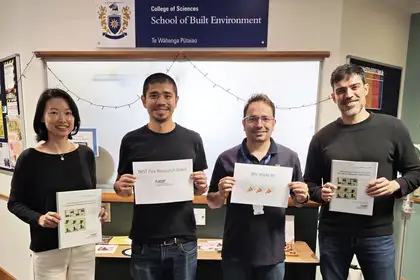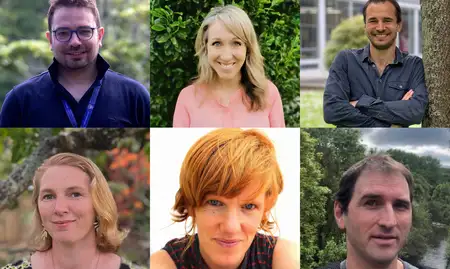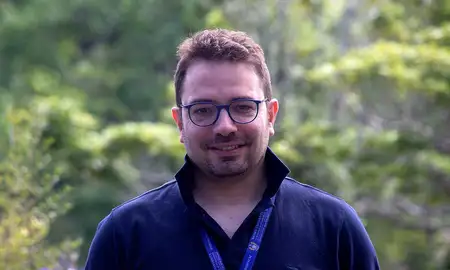
L-R: Dr Fei Ying, Dr Zhenan Feng, Associate Professor Ruggiero Lovreglio and Dr Daniel Paes.
The funding awarded will provide the team, led by Principal Investigator Dr Zhenan Feng, a year-long opportunity to advance their concept development and create the first module of the game.
Dr Feng says the main goal of the initiative is to create an immersive and engaging game that helps promote the guidelines developed by NIST around safeguarding property and communities against wildfires.
“The research developed by NIST has shown it’s not about one single action for your individual house, but that community is key for mitigating wildfire risk. Even if you feel your property is far away from the fire line or well protected, if your neighbour’s house isn’t secured, you’re still at risk. Buildings can catch fire from miles away from the bush due to contributing factors like embers, wind and topography. The idea of using gamification is to take the most critical of NIST’s guidelines and deliver them in a way that it is easily digestible to help increase awareness and teach people to be proactive to strengthen their communities.”
The idea behind the game is for it to include gaming mechanisms such as rewards and the need to complete tasks to enhance engagement and learning, while still remaining accessible.
“The goal is to create an immersive experience that incorporates recordings of wildfires to highlight how serious the consequences can be, without making it overly complicated. We want to teach the general public how to protect themselves and their communities, and it will be available via multiple devices to make it as accessible as possible,” Dr Feng says.
Led by Dr Feng, the team from the School of Built Environment includes Associate Professor Ruggiero Lovreglio, who is providing mentorship, Dr Daniel Paes and Dr Fei Ying. External collaborators include Senior Social Scientist Lisa Langer from the New Zealand-based forestry research organisation Scion, Research Officer Dr Max Kinateder from the National Research Council Canada and Dr Xilei Zhao from the University of Florida, which will assist with data collection during testing.

Dr Feng says once the initial game module is developed, testing will take place in wild-fire prone communities to measure its effectiveness.
“The most important thing is that people are picking it up and engaging with the information to implement it in their lives. If it goes well, we can look to reapply to NIST to secure further funding to continue the initiative. My hope is that we can elevate this project to help the vulnerable communities in the United States and eventually, expand on it to bring it into a New Zealand perspective as well.”
The initial inception of the project came after a team from NIST, led by Fire Protection Engineer Alexander Maranghides, delivered the Hazard Mitigation Methodology report. The research, based on 20 years of field investigations and laboratory experiments, has identified essential tools and guidelines to mitigate future wildfire occurrences and improve community safety.
It was during a visit to NIST by Dr Lovreglio earlier this year that the idea began to take form and develop.
“Having a longstanding relationship with NIST and Mr Maranghides, I had the opportunity to spend a few months in the United States working with the Fire Division. The initial report, although incredibly valuable, was intimidating due to how extensive and information dense it was. As a result, the team were looking into making a website, but my team and I believed we could help push it further by building a game based on their work,” Dr Lovreglio explains.
He says learning from disasters is crucial for community resilience.
“As a society, we can be limited when it comes to disasters. They happen, we do something about it at the time, but can fail to let these learnings help us be proactive and strengthen us for the next disaster. Wildfires aren’t going away. Instead, the intensity of each event is increasing. This game offers an opportunity to learn from past experiences and could help millions of people living in vulnerable communities. With each module, we plan to build upon the foundations of knowledge and really focus on highlighting the need for a community mindset when it comes to building resilience.”
Related news
How data-based tools can prevent crowd crushes
New research, recently published in Science highlights how analysing and monitoring crowds can help prevent deadly crowd crush incidents.

Transgender family support, translating Mātauranga Māori, and viral warfare research among Marsden successes
Te Pūtea Rangahau a Marsden, the Marsden Fund, have announced funding for 13 Massey research projects.

Award-winning researcher fighting fire with data
Senior Lecturer and Associate Lead of Research in the School of Built Environment Dr Ruggiero Lovreglio has been announced as a winner of the Society of Fire Protection Engineering Five Under 35 .
